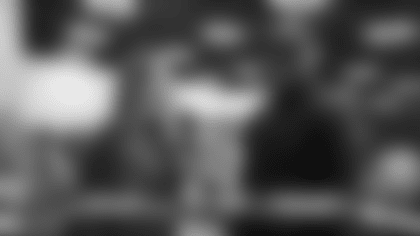*Vikings General Manager Rick Spielman *
First off, just like to thank the staff, the coaches, and especially the scouts for all their effort and energy they put into this every year. I'd like to recognize Jamaal Stephenson for his leadership as he kind of guides us through the process, all the way back when we had our first meetings in December, through our February meetings and as we all come together as one group and finalize our draft board. Feel very strong about this draft.
I think the depth of this draft class, especially in some of the areas we'll be looking at are very significant, I think through the mid rounds, and for us to have an extra third, an extra fourth this year, is going to pay dividends for us. Other thing I would like to point out is just working and seeing Coach [Pat] Shurmur at the end of the season with a new offensive coaches coming in, sitting down and with Coach Zimmer and Coach Shurmur and identifying the traits we're looking for on the offensive side of the ball and what's going to fit his scheme.
I know we are very in tune to what we are looking for on the defensive side, and I think we feel very strongly that we can identify those players in this draft that are going to fit the specific skill set that we are going to need to perform in Coach Shurmur's offense. I think it will be a big weekend for us. I know we're going to add a lot of quality players and there will be a lot of new faces going into this next season. So I'll open it up for questions.
Q: Is it more of a challenge, less of a challenge, when you don't have a first round pick?
A: I wouldn't say it's more or less. I think you approach every round, and we approach the board the same way every year. So we just put as much emphasis into the first round as we do into the fourth and fifth round, and I know probably over the weekend and finishing up yesterday, we really honed in on the sixth, seventh rounders.
I know I have to do a better job of college free agency. We will be much more aggressive in that area, something we haven't been in the past. I know with how we planned our roster going into 2017 and losing a lot of our backup-type depth players, that players from last year's draft class and this year's draft class coming in are going to have to play a significant role on this roster.
Q: The quarterback position, how does that look to you overall?
A: We looked at the quarterbacks. We didn't spend a lot of time on first couple up there. We're going to treat the quarterback position just like any other position as we go down through the draft, and if there's, you know, we spent time on a lot of those guys. I know Kevin Stefanski, who is now coaching the quarterbacks and Pat Shurmur spent a lot of time down at Senior Bowl. We spent a lot of time with them at the Combine. So I'm not going to say, we're not going to take one or we're going to take one. I think we will just see how the draft unfolds and who is there and who is not there.
Q: When you talk about needing to fill in some of the depth and what-have-you, does that affect the draft from a standpoint that maybe you might be looking for some more ready-to-play players than down the road guys?
A: We've always had the philosophy if I of just following our board. Where we are picking in the second round, we've already pounded it and we're going to do it again this afternoon, the potential scenarios that are going to be looking at us. Whether that's -- whatever position, we'll be prepared. We also talked about potentially any of those guys that may be developed in the first round, for some reason falling to us in the second round. And is that -- may not be a need but is that talent too great to pass up, because he's going to eventually be on a field and would hopefully be able to come on a field early his rookie year, if you're picking that high. So we are not going to box ourselves into saying, well, we have this need, so we have to take this position in this round. I think as you go down through the draft, you have to understand the depth of each position, so if you know, potentially you can get a position in the fourth round that may equate to that same value in a third round, then you may wait and take that position in the fourth round; where if you look at your draft board and you see the depth after the first seven or eight players, is not there, and they are equal in ability, then you are going to address a need that way.
So you just have to really understand where the depth of each position is in this draft and where you can hold and where you know you have to probably take that position, if it's on your draft board at that time and you have that evaluation on him.
Q: You've often in the past grabbed guys in the first round if you like them. Will you look into that again, or will you hold onto some of those picks for the depth?
A: I think just looking at where this is, for one, it's a pretty significant jump and pretty costly to go from where we are picking in the second round all the way back into the first. Two, I think there are a lot of quality players through the second, third and fourth rounds that can be significant players for us next year coming in. But you never know if something falls out of the sky that's just too good or you make that happen. But I would say as I'm standing here today, that's an unlikely scenario at this point.
Q: How do you wrestle evaluating the talent of a guy like Joe Mixon versus the video of what happened?
A: We spend a lot of time with that, not just him, but there's some other players with some issues in this draft. We are trying to do -- and I think we do a great job with all of our consultants with our effort that we put in to spend time with these players, and it's -- we sit there and it's got to be an organizational decision. And our ownership is included in that.
We present everything we have on paper, what the facts are, what our experts are saying, what type of kid this is; is it a one-time incident, is it something that there may be a pattern there that we don't want to deal with. So there's so many other things that aren't reported out there in the media, that we know, and we'll sit there and we come up and make, what is the best decision for the organization.
So as we go through these players and the players that do have issues and documented issues that are out in the media, we'll make an organizational decision on whether they are on our board or not.* *
Q: Is it different when there's video? I know in Ray Rice's case with the league it was different. Is there a difference?
A: Well, there's video, which makes it hard to watch to be honest with you. But also, I don't think you can take anything less lightly, if it's not on video. It's still the same and it's still the same situation whether it was on video or not.
I think you can't take anything less light, if that makes sense, if it's not on video.
Q: Has the organization already made a decision on Mixon?
A: We make decisions on a lot of players.
Q: Will you tell us one way or the other?
A: You can come up -- you want to see our draft boards afterwards, you're more than welcome.
Q: Where do you typically put the red dots on your guys?
A: It's at different points throughout our process. We finished up some red-carded or red-dotted players today, as we continue to get information and there's still information coming. I know we still are waiting on some things to come up until Thursday, and the people that are involved in that part of it, I just need to know and have an answer on where these situations stand by Thursday before the draft starts. So there's still some ongoing things that we have out there, but we'll have everything finalized and whether they are red dotted or not dotted, probably not until Thursday.
Q: How much did what you accomplish in free agency, how much will that affect how you prioritize things in the draft in terms of positions you target and things like that?
A: I think you look, you know, especially when you spend some money on free agency, but I don't think it precludes you from what you're going to do in the draft. Because some of those, you know, free agents, and how we structure their contracts, you know, are they one-year or are they going to be here for five, or some of the guys that we signed on the offensive line, do they have some position flexibility.
So when you know the guys that you signed and maybe some of them having some position flexibility, then that enables you to take the best player available. You know and if you're asking examples, just because we signed two offensive tackles in free agency doesn't mean if an offensive tackle was there that we wouldn't take him, either.
Our job is to try to get the best 53 players out there and then it's the -- I told Zim, I always kick the ball over to him and once we get the 53, it's get the best 11 out there on offense, defense and special teams and whatever combination that is.
Q: Is it a pretty big shift in what the offense wants?
A: From a schematic standpoint, I would leave that up to the coaches. Just from looking specifically at things from a personnel standpoint, for example, are we are going to be a power team or are we going to be more of a zone-scheme type team. Those are all the things when you're talking about offensive linemen, some of these guys have better skill set and better traits of and fit in one scheme than another. If we talk about the players -- and the coaches in all our meetings, the coaches did the group study film with us, just so we can see as the coaches explain, okay, this is what we are going to require this player to do and this is why this guy can't do it or this is why this guy can do it.
Very similar to when Zim came in and we started on the defense. We had a lot of film study and the type of traits that he was looking for on his defense. And I think we're at that point with our offense right now where we can really identify and look at these players to know if they are going to be able to function and what Pat wants to do or not.
Q: With Adrian signing with the Saints, it seems like closure. When you look back, what has he meant to the organization and what comes to mind?
A: Since he's with another team, am I going to let fined or lose a draft pick? No, Adrian, I've said it before, Adrian to me, since I've been here, the greatest Minnesota Viking to ever put on that uniform. He's a Hall of Fame player. He will go down in history as one of the greatest rushers in the NFL, if not the greatest. Unique individual. Great person. We were very fortunate and feel very blessed that we were part of, for the most part, his entire career here in Minnesota.
Q: Would you like to get a contract extension done with Sam Bradford or are there still answers you're looking for from Teddy Bridgewater before you commit?
A: One, I'm never going to talk about contracts and who we are extending and not extending into the future. We always keep that in-house. I know I sat with Rob Brzezinski looking at those scenarios and we already have some plans in place because I know we have some significant young guys coming up here in the future. So that process we've already started planning for but I won't get into specifics of who or what.
Q: You talked about some guys you have to look into their backgrounds. Do you dig deeper now than you have in the past so you're not surprised when things pop up?
A: Yeah, but some of it you're still surprised. I don't know what's going to pop up on draft day. I mean, we could have done our due diligence and you know, we have a great social media staff here and that's their area of expertise and I ask them specifically, go in and dig on Facebook, Instagram, Snapchat, whatever all that stuff is, and tell me what we know about these players. I know when we go into our formal interviews at the Indianapolis Combine and they come in here on the Top-30, I have pictures and a report and everything they are posting on Instagram, what they are posting on all their social media, and if it's something that's red flagged, then we address it with them.
I think some of these players are surprised what we're able to pull out. But you know, and I'm not knowledgeable enough, if it's like private and how you join into that is it stuff. I just ask questions and tell them what we need and I know they do a great job in getting as much information I know we can.
Q: How much of it is "we don't want this to happen again" and how much of it is "we don't want to be associated" when considering a player?
A: Well, those are decisions that we have to make, and that's why until you have all the answers to the test, and have dug in as deep and that's from evaluations to not only football but psychological evaluations to, you know, all of the police reports, talking to people that were associated with that incident, talking to his -- or people that are close to that situation, I mean, you try to talk and you try to get as clear a picture as you can, and by any avenue you can, and that's what we try to do with all these players that we potentially read that. Once we make that decision, then he's not a Minnesota Viking. But I do believe it has to be from an organization and what's best for this organization.
I think when we get the red flags in the beginning of our process and depending on how talented they are -- whether it's fair or not, the less talented you are, the more red flags you are, the more likely you're going to get a red dot, because is your talent worth the headache? But the higher you're up on the draft board, you're going to really spend and do your diligence on those players, because if they are that high on your draft board, then you're saying those guys are potential difference-makers for your football team. They can help you win and lose games.
Q: Everson Griffen was considered a character risk coming out. Is there something that assured you that he'd turn out okay?
A: I don't know if you're ever assured. Like I said, is this kid going to mature; how much does it mean to this kid if football is taken away from him? It's hard to just pinpoint one thing, because just like when you're drafting, everything is subjective and you're trying to base a subjective opinion off how much information that you have. But no one can really say that, you can truly predict what's going to happen. As some friends of mine that are in the Special Forces, they say, try to minimize your risk as much as possible by getting the most information, but can you eliminate a risk and say that absolutely there's no risk? I don't think you can ever do that because you don't know. But as long as you're doing your due diligence, and minimizing the risk as low as you can get it, then it gives you a chance.
Q: With him being a fourth rounder, does it reach a point where you say, it's worth a flyer whether he messes up or not?
A: I know in the draft room, if they are not red dotted but they are in a box, and which means they are still alive on our draft board and if you have a first-second-third round talent on a guy, you may hold and not take him, where his talent is, but when you get into fourth, fifth round, is it worth the risk, because financially, it's not as big of a risk, either, where it can hurt your club competitively. And if he does, you know, mess up or has to go then you didn't financially hurt your football team.
Q: Follow-up question to Bradford. If he doesn't sign an extension, having the franchise tag available, does that potentially buy you time in your estimation or buy you time to see how Teddy progresses?
A: Yeah, nothing is concrete or no decisions have been made. Teddy, I can tell you, our first week of off-season has been incredible. He's been in here working as hard as anyone, fighting his way back. I wouldn't put it past that kid how quickly he can comeback. But it's still unknown. You know, Bradford was here the very first day and leading the group and we are very fortunate to have both of those players at that position on our roster right now.
When those decisions are going to be made, there's no timeline.
Q: How has the draft changed over years in terms of guys who have been a sure thing? Is it more or less?
A: Yeah, I wish I knew. I haven't personally. You know some guys have a pretty good chance of being pretty good but I know for as much time as we evaluate these guys and go over it and go over it and go over it, you come to a point almost where it's no return, where no one is a for sure thing. But the draft is very subjective, and like I said, you try to do everything you can to minimize the risk when you make those selections by doing your due diligence. And I have no doubt that we do everything we have possibly can to do our due diligence and there's a lot of -- that's spread out through a lot of different people in this organization to have specific roles in whatever areas we're asking them to explore.
But the draft, I mean, if there was for-sure things, and maybe if every first rounder you would be 100 percent. We've looked at the percentages of what the first rounds are, what percent are going to be blue, top players and what ones are red starters, what ones are a miss. We spend a lot of times on it -- draft boards and things that are going to be totally different this year is in the third round there are so many more compensatory picks than there's ever been. I think there's eight more third round compensatory picks this year.
So what does that do, in a normal draft, okay, now your fourth rounder is not the true value. Just saying a fourth rounder is actually pushed down by eight more players. The other thing that's going to be extremely, I would say exciting, but there's going to be a lot of activity. This is the first year I believe that you can trade those compensatory picks. So there's going to be a lot more movement I think because of those picks being able to be traded.
Q: Do you look at guys from five years ago and how they turned out? How you're doing?
A: Our basic way we do things, we do this every year is you have to have a three-year snapshot. We go all the way back to 2005 now, and what we graded them as college, what they ended up being with their pro grades, how they ended up performing and you take those two and then you start, that's when the analytics come spinning back in.
And we're to the point now where you can say, well, this guy that made it that was a red player or a blue player, had out of the 2,500 traits that we looked at from effective commitment in a psychological score to his arm length to a short shuttle, those were the three most important things at the offensive center, okay, they spin it through their algorithms and bam, this guy is similar to that guy that came out in red or bam, this guy is similar to that guy that failed.
So we are really developing every year and this year took another significant step. I guess we are almost in the process of cloning right now is maybe the best way to put it.
Q: The whole college game has changed so much and what they ask the guys to do is so different from what they do in the NFL, does that make scouting and evaluation and projecting more difficult?
A: What I think you're seeing in the league is that some of that is evolving up to our level. I think Zim gave you the fact, when the nickel is playing 70 percent of the defensive snaps, it wasn't like that ten years ago, but that's because of the athletes and the type of players that are coming out of college now. So I think you still have to -- and while I always believe, you still have to run the ball, play good defense, and to win championships, but, our game has evolved a little bit because of the type of athletes that are coming out and you see us adapting a little bit because that's the players we're choosing.
Q: How close is everyone physically and how much do you have to look into what kind of person they are, not character, but how important is football or are they more interested in reading books?
A: That's a major part of it. In every player that I've probably missed on, and I've learned, is that you can have height, weight, speed, all the athletic ability but if you truly don't have passion for playing this game, and we call them underachievers, and if you have a U on your card, we've learned not to take those guys regardless of how talented they are from a physical standpoint. Because unless you love what you do when you get up every morning, I don't think you're going to have a chance to have success.
With the pressure and the demand that's on these players, and these coaches, every Sunday, and every week, you'd better have passion for what you do or you're not going to have a chance. And we've really honed in and focused on that passion part.
All those things are keys in breaking ties for us. Once we do the ability part, and have them stacked on the ability part, then all those ancillary things, which are a lot, come in to separate it for us.
Q: You've drafted some good players in the second round, some of those guys, does it help that maybe they think they should have gone in the first round and then they come in with that chip on their shoulder?
A: Yeah, but I've drafted seventh rounders and college free agents -- I thought I should have been a first rounder, my brother was -- he did. You want those guys. It's just that's the passion for the game and a chip on their shoulder. I don't think if those guys would have went in the first round, they would have performed any less. Just because once we get -- I tell all the players, once they come in here and we talk about this, once you're a first rounder, seventh rounder if you're Adam Thielen which we were fortunate enough and very lucky to find in our rookie mini-camp who wasn't even signed after the draft or Marcus Sherels, it doesn't matter. What matters is when you come in here, everybody is on a level playing field and Coach Zimmer and his staff believe in, we want the best 53 players and I don't care where you're drafted or where you came from. If you're the best 53 player, you're the best 11 on offense or defense, you're going to play, because we have to win ball games. That's what we're in this business for.














